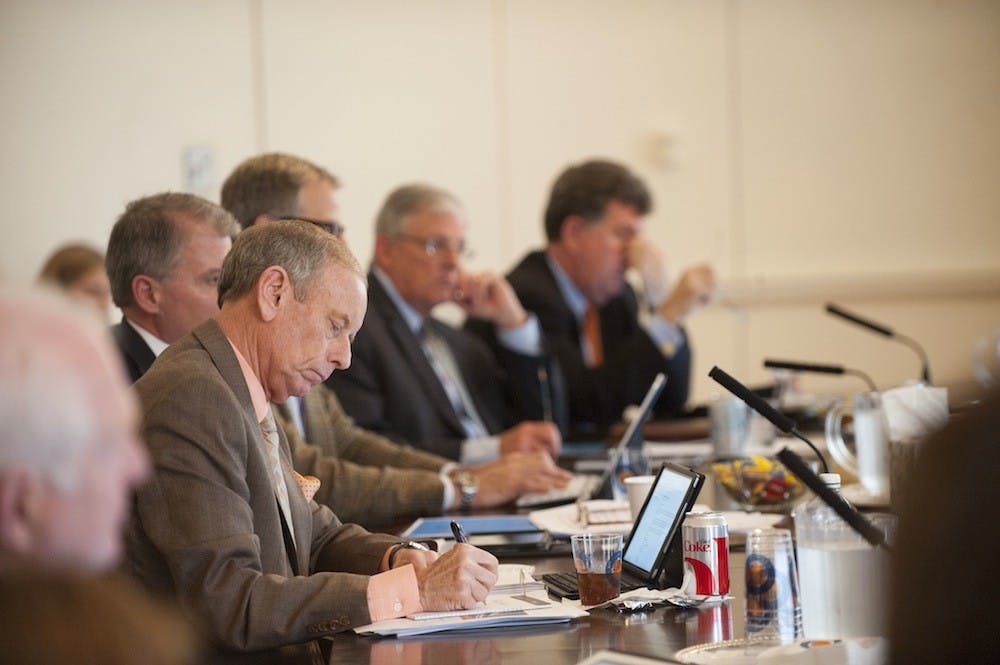Board of Visitors increases graduate tuition
Graduate program costs grow between 1.2 and 19.6 percent
By Owen Robinson and Annie O’Brien
The Board of Visitors voted last week to increase the tuition rates for many graduate programs offered by the University, both in the College and other schools. The increases in tuition and fees range between 1.2 and 19.6 percent, with rates varying for in-state and out-of-state students.
Though there are many factors which drive growth in tuition costs, three principal causes at the University this year were the growth in prices set by peer universities, inflation and growth in faculty salaries, said Colette Sheehy, the vice president for management and budget. The last is a key part of the University’s strategic vision, aimed at increasing the University’s salaries relative to rival institutions.
“We’re looking to regain the 20th position among AA institutions in terms of highest salaries, which means a 4.4 percent increase in salaries per year for faculty,” Sheehy said.
Some of this growth is shouldered by the state, but the majority of the burden falls on the University.
“The state has a cost-sharing formula for higher institutions — even when the state approves a raise, they never fund 100 percent of the cost,” Sheehy said.
State support only constitutes about 10 percent of additions to the budget, Sheehy said. In order to meet expenses, the University has to turn, in part, to tuition.
At the Medical School, for example, “tuition covers slightly more than one-third of costs related to medical education,” said Anne Kromkowski, associate dean for finance and administration at the Medical School.
The changes to graduate program tuition were also made in response to tuition rates at the University’s peer institutions. As with salary increases, the University is striving to keep pace with prices set by other schools.
Law School Dean Paul Mahoney said the Law School determines its tuition by looking at what the market is charging — when peer institutions raise their prices, the Law School follows suit.
Tuition for both the Law School and the Darden School, however, was below the average charged by peer universities this past year, prompting a tuition increase of a greater degree than what was generally seen for other graduate programs. The Law School will raise tuition between 4 and 8.1 percent for Virginians and 3.6 percent for non-Virginians, and Darden’s tuition will rise by 4 percent for current Virginian students, 8 percent for incoming Virginians and 3.7 percent for current and incoming non-Virginians. The tuition increases vary within schools based on which program student apply to.
The Medical School and the Commerce School will also expand graduate tuition, but at lower rates. The increase will between 1.3 and 3.1 percent and 1.6 and 2.9 percent, respectively, with little to no difference for in-state and out-of-state students.
“The School of Medicine’s tuition was increased by an inflationary adjustment based on the Higher Education Price Index and slight increases in non-personal, instructional costs,” Kromkowski said. “We have made a concerted effort to control costs and only pass along unavoidable increases.”
Other graduate programs in the College, the Nursing School, the Engineering School and the Batten School also moved to raise tuition levels. Aside from changes in the Batten School and the Nursing School — with graduate programs changing respectively up to 6.1 and 19.6 percent — increases come between 1.3 and 3.1 percent, with little to no difference between Virginians and non-Virginians.
With the approval of these changes, the Board also discussed the potential need for new initiatives to help students meet tuition costs. The Law School, particularly, hopes to increase student aid for in-state students in proportion to growth in their tuition.
Sheehy said she does not anticipate any additional significant increases to tuition costs for graduate schools in the near future..
“I don’t really expect anything extreme, but there might be some [change],” Sheehy said. “There are a few specialized programs that might try to peg their rates to more competitive levels.”
Any other future growth in graduate tuition is likely to mirror general changes in the tuition level among the University’s competitors and future inflation patterns, she said. Mahoney said he thinks the Law School’s tuition will likely stay slightly below the average cost of peer institutions.
Kromkowski also said the Medical School’s aims to remain close to peers. However, the school, he said, also intends to remain “sensitive to our student debt levels,” which right now sit in “the bottom quartile.”
No changes to undergraduate tuition have yet been made by the Board, but adjustments will likely be announced later in the year.
“One of the reasons [undergraduate rates] come out later is because we don’t know what’s going to happen in the Virginia legislature,” University President Teresa Sullivan said. “We don’t know what our appropriation will look like, and we don’t know what costs will be passed on to us. We’re pretty sure there’s a big cost coming for the Virginia retirement system, because it’s already in state law.”
Sullivan said the University will do all it can to prevent rising costs from reflecting strongly on undergraduate tuition.
“We do our best to come up with savings elsewhere in the budget before we have to turn to raises in the tuition,” she said. “But we’re not ready to give an [undergraduate] tuition figure yet.”







